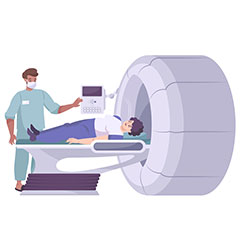Overview
Our Oncology Department is committed to offering comprehensive cancer care, ranging from early detection and diagnosis to advanced treatments. With state-of-the-art technology and personalized treatment plans, we provide expert care across all types of cancer. Our multidisciplinary team ensures that patients receive the most effective and compassionate treatment.
TREATMENTS & PROCEDURE

Drug Therapy to Kill Cancer Cells and Stop Their Growth
Chemotherapy uses potent drugs to target and destroy cancer cells. It’s a systemic treatment that can be used alone or in combination with other therapies, making it effective for a wide range of cancers.

Precision Radiation to Target and Shrink Tumors
Radiation therapy uses high-energy radiation to destroy cancer cells and shrink tumors. It’s commonly used for cancers such as breast, lung, and brain, and can be delivered externally or internally depending on the cancer type.

Boosting the Immune System to Attack Cancer Cells
Immunotherapy enhances the body’s immune system to recognize and fight cancer cells more effectively. It has shown great success in treating cancers like melanoma, lung cancer, and some blood cancers by stimulating the body’s natural defenses.

Surgical Removal of Tumors to Prevent Cancer Spread
Surgical oncology involves the removal of cancerous tumors to prevent the spread of disease. Depending on the type and stage of cancer, surgery may be curative or combined with chemotherapy or radiation therapy for better outcomes.

Precision Medicine Targeting Cancer Cells While Sparing Healthy Ones
Targeted therapy uses drugs designed to specifically attack cancer cells based on their genetic makeup. It is often used for cancers like breast, lung, and colorectal cancer, minimizing damage to healthy cells and reducing side effects.
Drug Therapy to Kill Cancer Cells and Stop Their Growth

Chemotherapy uses potent drugs to target and destroy cancer cells. It’s a systemic treatment that can be used alone or in combination with other therapies, making it effective for a wide range of cancers.
Precision Radiation to Target and Shrink Tumors

Radiation therapy uses high-energy radiation to destroy cancer cells and shrink tumors. It’s commonly used for cancers such as breast, lung, and brain, and can be delivered externally or internally depending on the cancer type.
Boosting the Immune System to Attack Cancer Cells

Immunotherapy enhances the body’s immune system to recognize and fight cancer cells more effectively. It has shown great success in treating cancers like melanoma, lung cancer, and some blood cancers by stimulating the body’s natural defenses.
Surgical Removal of Tumors to Prevent Cancer Spread

Surgical oncology involves the removal of cancerous tumors to prevent the spread of disease. Depending on the type and stage of cancer, surgery may be curative or combined with chemotherapy or radiation therapy for better outcomes.
Precision Medicine Targeting Cancer Cells While Sparing Healthy Ones

Targeted therapy uses drugs designed to specifically attack cancer cells based on their genetic makeup. It is often used for cancers like breast, lung, and colorectal cancer, minimizing damage to healthy cells and reducing side effects.
Diseases treated
FAQs
We treat a wide range of cancers, including breast, lung, colorectal, prostate, brain, and blood cancers like leukemia and lymphoma.
Radiation therapy uses high-energy radiation to target cancer cells, while chemotherapy uses drugs to treat cancer systemically. Both can be used together depending on the cancer type.
Not always. Surgery is one option among others like chemotherapy, radiation, and targeted therapy. The treatment plan depends on the type, stage, and location of the cancer.
Yes, some cancers can be treated with non-surgical options like radiation, chemotherapy, or immunotherapy, depending on the cancer type and its stage.
Side effects can include fatigue, nausea, hair loss, and a weakened immune system. Our team works closely with patients to manage these symptoms effectively.
Immunotherapy helps your body’s immune system identify and attack cancer cells. It is especially effective for cancers like melanoma and lung cancer, often with fewer side effects than chemotherapy.
Targeted therapy uses drugs designed to specifically target cancer cells’ genes and proteins. It offers a more precise approach compared to traditional chemotherapy.
The frequency depends on the treatment plan. Chemotherapy might be administered weekly or every few weeks, while radiation therapy often requires daily sessions over several weeks.
Oncology Doctors


















